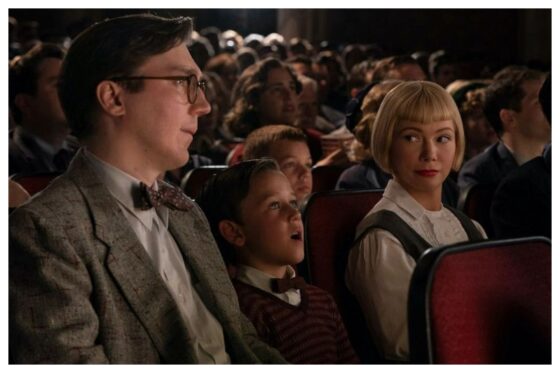TIFF 2022 | The Fabelmans (Steven Spielberg, US) — Special Presentations

By Will Sloan
Steven Spielberg has made at least ten movies that have become part of American folklore, and has ascended to the very highest echelon of society, so if there’s any living filmmaker whose perspective on himself and his work are of interest, it’s him. The chief insight that his cinematic self-portrait/origin myth The Fabelmans offers into his artistic temperament comes early, after little Sammy Fabelman goes with his parents (Paul Dano and Michelle Williams) to see his first-ever movie, The Greatest Show on Earth (1952). Both terrified and fascinated by DeMille’s show-stopping train-crash, he uses an 8mm camera to film and refilm a similar crash with his dad’s electric train set at home. Filmmaking, his mother realizes, is how he can control his fear.
For much of his career, Spielberg was dogged by criticism that his populist cinema of sharks and dinosaurs represented a retreat into childhood. When he has turned his attention to more “adult” topics—slavery, the Holocaust, the Pentagon Papers—he has tended to focus on the people who put a stop the madness and reaffirmed humanity’s essential goodness. The Fabelmans climaxes with Sammy (Gabriel LaBelle as a teenager) projecting a year-end home-movie at the school prom in which he turns an anti-Semitic bully into a beautiful Übermensch worthy of Leni Riefenstahl. The bully is flabbergasted: why did Sammy make him look so good? Sammy isn’t sure. Maybe to make the bully realize that he is a fraud? Maybe to fix in art what is broken in life?
Beyond its major insight, the film is unhelpful at telling us about Spielberg’s artistic process and evolution. The young Steven (let’s dispense with this “Sammy” business) is depicted as a preternaturally gifted filmmaker who already has audiences cheering and weeping while he’s still working in 8mm. In fairness, Spielberg has earned the right to be a little self-aggrandizing: here once again, every scene is composed, lit, paced, and edited with the technical perfection that has made Spielberg almost peerless. Of course, technical perfection has to be accompanied by something greater, and happily, The Fabelmans is more about the parents than the child.
At the Q&A immediately following the TIFF press screening, Spielberg suggested that much of his career has been spent refracting the trauma of his parents’ divorce, and that he was now finally ready to address it head-on. Viewers intimately familiar with Spielberg’s biography will recognize that he’s still not entirely done with massaging the imperfections of life in his art. Even so, the eternal Boy Genius demonstrates a grown-up understanding of how marriage is a long haul, and how love can endure without being enough, and how life is a series of decisions with life-or-death consequences, even if we don’t literally die. Spielberg hasn’t always been comfortable with complex emotions, but at its best, The Fabelmans admirably follows Ford’s advice about where to put the horizon line.
Will Sloan

